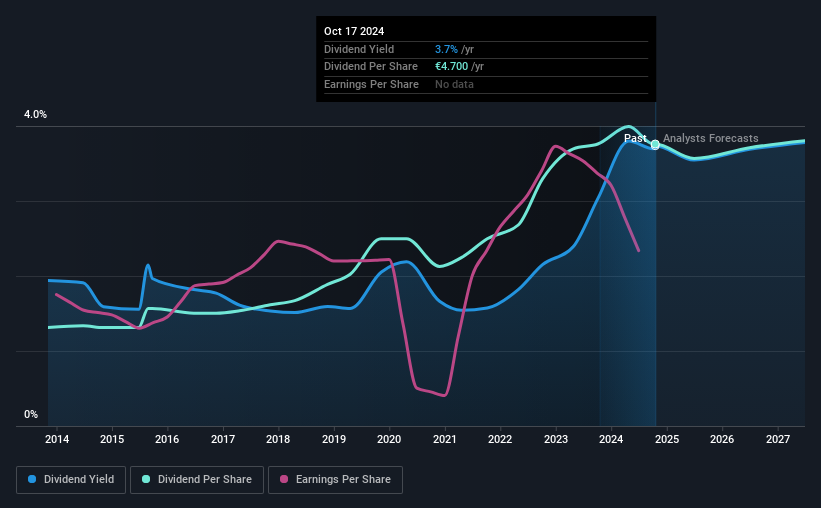
Pernod Ricard SA (EPA:RI) has announced that it will pay a dividend of €2.35 per share on the 27th of November. The yield is still above the industry average at 3.7%.
View our latest analysis for Pernod Ricard
Pernod Ricard's Future Dividend Projections Appear Well Covered By Earnings
We like to see robust dividend yields, but that doesn't matter if the payment isn't sustainable. Prior to this announcement, Pernod Ricard's dividend was making up a very large proportion of earnings and perhaps more concerning was that it was 124% of cash flows. This is certainly a risk factor, as reduced cash flows could force the company to pay a lower dividend.
Over the next year, EPS is forecast to expand by 50.5%. Under the assumption that the dividend will continue along recent trends, we think the payout ratio could be 59% which would be quite comfortable going to take the dividend forward.

Dividend Volatility
The company has a long dividend track record, but it doesn't look great with cuts in the past. The annual payment during the last 10 years was €1.64 in 2014, and the most recent fiscal year payment was €4.70. This works out to be a compound annual growth rate (CAGR) of approximately 11% a year over that time. Dividends have grown rapidly over this time, but with cuts in the past we are not certain that this stock will be a reliable source of income in the future.
The Dividend's Growth Prospects Are Limited
With a relatively unstable dividend, it's even more important to evaluate if earnings per share is growing, which could point to a growing dividend in the future. Pernod Ricard hasn't seen much change in its earnings per share over the last five years. Pernod Ricard's earnings per share has barely grown, which is not ideal - perhaps this is why the company pays out the majority of its earnings to shareholders. When the rate of return on reinvestment opportunities falls below a certain minimum level, companies often elect to pay a larger dividend instead. This is why many mature companies often have larger dividend yields.
The Dividend Could Prove To Be Unreliable
In summary, dividends being cut isn't ideal, however it can bring the payment into a more sustainable range. The payments are bit high to be considered sustainable, and the track record isn't the best. We would probably look elsewhere for an income investment.
Companies possessing a stable dividend policy will likely enjoy greater investor interest than those suffering from a more inconsistent approach. At the same time, there are other factors our readers should be conscious of before pouring capital into a stock. For example, we've identified 3 warning signs for Pernod Ricard (1 is significant!) that you should be aware of before investing. Looking for more high-yielding dividend ideas? Try our collection of strong dividend payers.
New: Manage All Your Stock Portfolios in One Place
We've created the ultimate portfolio companion for stock investors, and it's free.
• Connect an unlimited number of Portfolios and see your total in one currency
• Be alerted to new Warning Signs or Risks via email or mobile
• Track the Fair Value of your stocks
Have feedback on this article? Concerned about the content? Get in touch with us directly. Alternatively, email editorial-team (at) simplywallst.com.
This article by Simply Wall St is general in nature. We provide commentary based on historical data and analyst forecasts only using an unbiased methodology and our articles are not intended to be financial advice. It does not constitute a recommendation to buy or sell any stock, and does not take account of your objectives, or your financial situation. We aim to bring you long-term focused analysis driven by fundamental data. Note that our analysis may not factor in the latest price-sensitive company announcements or qualitative material. Simply Wall St has no position in any stocks mentioned.
About ENXTPA:RI
Slight second-rate dividend payer.
Similar Companies
Market Insights
Community Narratives



